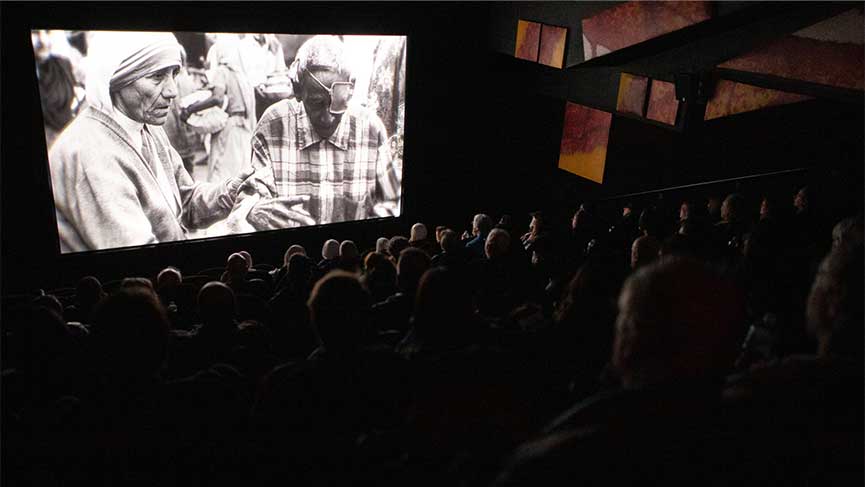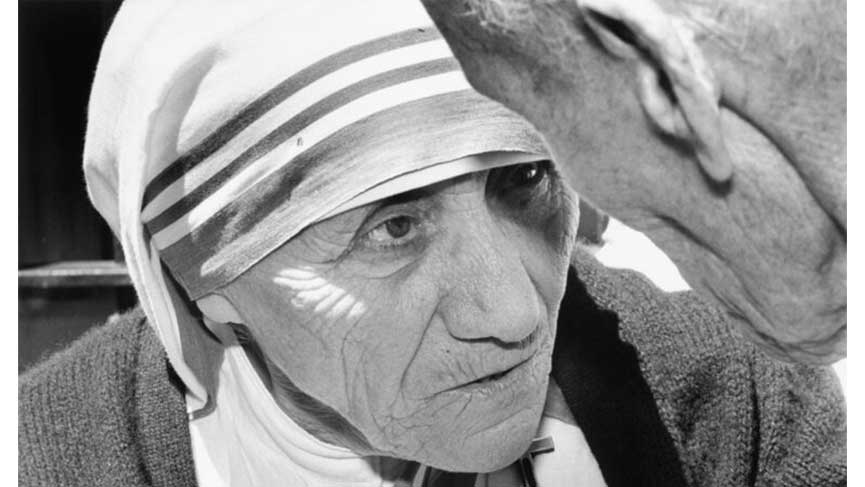“Mother Teresa: No Greater Love”

Montreal
LeVerbe - By Brigitte Bédard (Translated by the Archdiocese of Montreal)
With its release timed to coincide with the 25th anniversary of her death, the film “Mother Teresa: No Greater Love” honours the life and work of the saint, of course, but succeeds in doing much more. With its stunning footage, moving testimonies and rare archival material, the documentary reveals with artistry how great an impact this woman has had on our world.
Sister Mary Teresa of the Sisters of Loreto was In Kolkata in 1948 when she "received a call within a call." She left her convent and went to teach street children, founding the Missionaries of Charity (MC) with a few fellow sisters in 1950.
Thus was born the first house, a true "tabernacle" for the poor, the destitute, the sick and the abandoned. Today, there are 764 of them distributed among all the continents.
Around the world
We visited the Boa Vista camp in Roraima, Brazil, where the sisters welcome Venezuelan refugees, most of whom are mothers with children, providing them food and care.
In Rio de Janeiro, it is the land of crack, littered with actual human shipwrecks wandering the streets, homeless, in dire need, ravaged by drugs, and still welcomed and fed by the sisters. These scenes are hard to watch.

Are the sisters attempting to convert them? To upbraid them? No. One man, a simple layman who was moved by the MCs’ dedication and decided to join them, says quite plainly: "I learned not to judge, just to give food and say, "God loves you!" That's all."
How can they work in such circumstances without becoming discouraged, and especially without losing that gentle smile? As one of the sisters says, "Mother Teresa used to tell us that we should pray and worship more."
"She said that if we don't prostrate ourselves before the Lord, we become social workers.” For Mother Teresa, a poor person is a living host and nothing less. And the sisters must prostrate themselves before these living hosts. “When we have prayed and worshipped for hours," she said, "we touch the body of Jesus in the poor person.”
“If we do not prostrate ourselves before the Lord, we become social workers. When we have prayed and worshipped for hours, we touch the body of Jesus in the poor.”
Throughout the documentary are scattered amusing anecdotes, among them one about the British journalist Malcolm Muggeridge who one morning happened to show up at the Kalighat Home for the Dying in Kolkata to interview Mother Teresa; he wanted to make a documentary. She refused. She did not like publicity. Muggeridge went to the Vatican and won his case. The Holy See, through the local bishop, ordered her to accept. She obeyed. The documentary called “Something Beautiful for God” appeared in 1969 on the BBC and was followed by the book in 1971... The Nobel Peace Prize came in 1979.
A radical love
Through the numerous testimonies, whether told by her spiritual daughters, volunteers, priests, or by people who had the opportunity to meet her, if only for a moment, it is clear that everyone who stood before her had the impression they were the only other person in the world. Mother Teresa’s attention belonged to them alone.
The most heartrending of these testimonies is certainly that of the former crack addict who had met Mother Teresa while visiting Jelani House in San Francisco.
Like all the young single mothers in the house, she was staying there until she gave birth to her child, who would then have to go through withdrawal. Mother Teresa was there, very small, standing in front of us," she recounts. “She told me that my life was ahead of me. That I could do anything I wanted, thanks to God.” Thirty years later, this woman shows us a photograph of her daughter, radiant, married, with children of her own.
Or the story of Jim Wahlberg, brother of actor Mark Wahlberg, who met Mother Teresa while he was in prison. "She told us that we were children of God, and that Jesus Christ had died for us, and that because of that we were so much more than the numbers they gave us when we entered prison, that we were more than the crimes we had committed. God loved us, she said.” Jim's life would take a very different course from that time forward.
We were surprised to learn that John Paul II, with whom she had developed a friendship, asked her in the early 1980s to provide care to AIDS patients, a disease that was raging, but moreover stigmatized those who were afflicted with it. On Christmas Eve 1985, a house opened in Harlem, much to the dismay of the local authorities.
The viewer, whether a believer or not, cannot help being moved – to tears for some - by this radical love of Mother Teresa and all the sisters who decided to follow her. One is struck by the real, tangible impact of this dedication without measure to the poor of our world. It is so persuasive that, irresistibly, one may be overcome by the desire to be, quite simply, holy.
The film “Mother Teresa: No Greater Love” has been playing in movie theatres in Quebec since January 27, 2023, in all Guzzo cinemas. For all details and screening times, see: https://www.cinoche.com/films/mother-teresa-no-greater-love

Comment
Comment
Add new comment